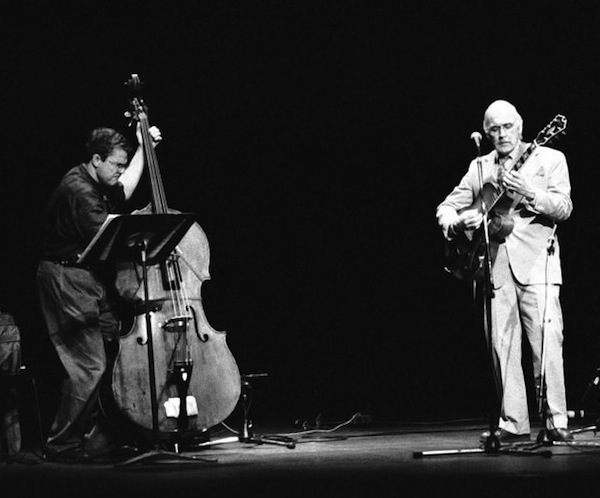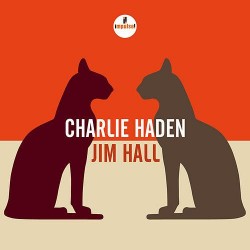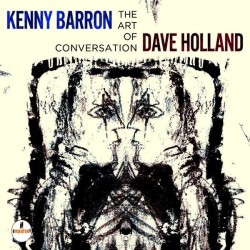Jazz Album Reviews: Two Remarkable Duets — Charlie Haden/Jim Hall, Kenny Barron/Dave Holland
Jim Hall sounds at his best on these newly issued duets. So does Charlie Haden, whose plangent sound has rarely, if ever, been captured so well.
Charlie Haden/ Jim Hall, Impulse 76502
The Art of Conversation, Kenny Barron/ Dave Holland, Impulse 169802

Bassist Charlie Haden performing with guitarist Jim Hall. Photo: Jan Thijs.
By Michael Ullman
These are two magnificent sets of duets, and there are significant connections between them. On four consecutive nights in 1991, pianist Kenny Barron recorded duets at the Café Montmartre with the cancer-stricken tenor saxophonist Stan Getz. A selection of what they performed was issued as People Time, a celebrated two-disc set. (Recently, all of the music from those nights in Denmark has been issued on a seven-disc version of People Time.) Getz’s repertoire was wide, but on those nights he turned three times to “First Song,” a ballad by bassist Charlie Haden. Some critics think the Getz-Barron version of “First Song” issued on the first People Time is the saxophonist’s greatest ballad performance.
The previously unissued Charlie Haden/Jim Hall was recorded a year earlier, on July 2, 1990, at the Montreal Jazz Festival. A highlight of what is an exquisitely tasteful, robust, and lyrical set is the duo’s version of “First Song.” Pianist Kenny Barron is heard here on The Art of Conversation with bassist Dave Holland. He also recorded a disc of duets with Charlie Haden (Night and the City, Verve) and a trio set with Haden and Roy Haynes (Wanton Spirit, Verve). In 2001, Hall recorded two duets with Holland (on Jim Hall and Basses, Telarc). All that is missing is a set with the two bassists playing together.

Musically, Haden and Hall had much in common. Haden produced a large, beautiful sound, and he had a naturally lyrical bent: his warmth was an anchor for the original Ornette Coleman quartet. Though the theme song of his parents’ country band was “Keep on the Sunnyside of Life,” Haden’s compositions, including “First Song” (included on the duet disc) and “Song for Che,” often had a melancholy bent. He played free jazz with Coleman and ballads with his own groups: his solos on the latter demonstrated his oblique approach to harmony, as if he were skirting the edges of what a composer had written without entirely losing its shape or purpose. Hall is among jazz’s most lyrical guitarists, a quality he established early on in his career in his performances with Chico Hamilton, Jimmy Guiffre, and especially Paul Desmond. He was also one of the more adventurous guitarists, as in his trio playing with Sonny Rollins. He had an inquiring mind: one of my favorite photos of him finds him looking up quizzically at Giuffre. Like Haden, he was intrigued by what could be done with harmony, with how the skeleton of a tune could be rewritten and made new. Watching him in later years could be a little daunting, as he took paths from which there seemed to be no return. “He’s the best,” Pat Metheny once said to me after a Hall solo at the Regattabar.
Hall sounds at his best on these newly issued duets. So does Haden, whose plangent sound has rarely, if ever, been captured so well. Sound was important to him, and to his listeners. Haden could play a slowly ascending scale and turn it into high drama. Haden opens the set with a genially swinging solo, much more cheerful than was his wont. Hall enters with the melody of Thelonious Monk’s “Bemsha Swing.” Haden’s stop-and-go solo suddenly makes perfect sense as a tribute to Monk’s bumptious style. Choruses of Hall’s chording over Haden’s mostly walking bass follow, until the guitarist starts to go further out both harmonically and rhythmically, as if daring Haden to follow him. Hall returns to Monk later when—in the middle of his solo on Ornette Coleman’s blues tune “Turnaround”—he quotes “Blue Monk.” Hall then comes to a dead stop, and Haden takes over in a new direction as cleanly as if he hadn’t been around for the guitarist’s solo. In a conversation one is allowed to introduce new topics. They improvise on Hall’s delightful “Down from Antigua.” Haden plays the tune’s melody straight over the unamplified strumming of Hall: no bass that I know of has sounded richer. The two add new meaning to the ballads “Skylark” (Hall plays the first and last choruses solo) and “Body and Soul.” The pair finish with Haden’s “In the Moment,” which is where great jazz like this places us. Please don’t doubt my rave: Charlie Haden/ Jim Hall is already one of my favorite sets, and not just from this year.

The Art of Conversation is a slightly breezier set, though it is played by two master musicians and the performance is just as engaging. Many of us first heard Barron with Dizzy Gillespie in the ’60’s and much later, with the Monk-oriented group Sphere. He still bops. On this disc he once again pays tribute to Monk with “The Only One” and “In Walked Bud.” His playing seems to only have gotten more lyrical since his first album as a leader. (It had the provocative title You Had Better Listen. Co-led by trumpeter Jimmy Owens, the cover art featured a photograph of a worried-looking Owens on a staircase with Barron lurking behind him.) Barron finds the duet form very congenial: besides this new album, he’s recorded duets with bassist Buster Williams and with guitarist Ted Dunbar. Holland is a wonder, who has enlivened groups starring Miles Davis and Anthony Braxton, two opposing sensibilities. In Boston he has performed solo versions of such impossible vehicles as Mingus’s “Haitian Fight Song.” Here he plays a chorus of Barron’s “Rain” that’s so lovely that only its composer would dare follow it. Barron does, with his usual elegant touch and sure flow of melody. They dance through Charlie Parker’s “Segment,” managing to sound playful yet secure even at Parker’s torrid tempo. Their balanced version of Billy Strayhorn’s “Day Dream” is both subtle and intense. We have lost Haden and Hall recently. It is reassuring to know that we can expect more terrific performances from Barron and Holland.
Michael Ullman studied classical clarinet and was educated at Harvard, the University of Chicago, and the U. of Michigan, from which he received a PhD in English. The author or co-author of two books on jazz, he has written on jazz and classical music for The Atlantic Monthly, The New Republic, High Fidelity, Stereophile, The Boston Phoenix, The Boston Globe and other venues. His articles on Dickens, Joyce, Kipling, and others have appeared in academic journals. For over 20 years, he has written a bi-monthly jazz column for Fanfare Magazine, for which he also reviews classical music. At Tufts University, he teaches mostly modernist writers in the English Department and jazz and blues history in the Music Department. He plays piano badly.
Tagged: albums, Charlie Haden, Dave Holland, duets, Jim Hall, Kenny Barron
